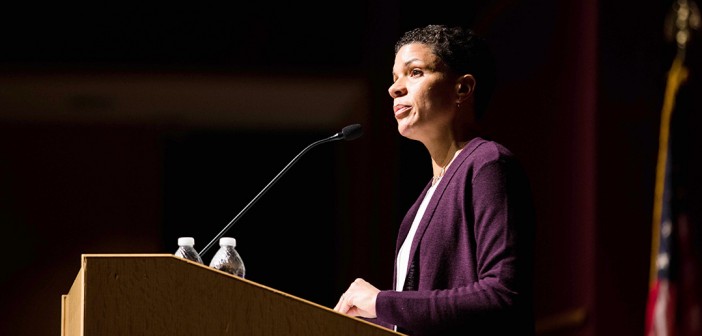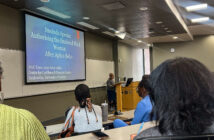Michelle Alexander, the author of “The New Jim Crow: Mass Incarceration in the Age of Colorblindness,” urged conversation surrounding issues in the black community during her lecture Wednesday night.
Alexander, who is a New York Times best-selling author and civil rights lawyer, was the keynote speaker in the yearlong Martin Luther King Jr. Celebration happening at Lehigh. During her lecture, she discussed the need to end mass incarceration, value all lives and eliminate discrimination.
Alexander said mass incarceration of African Americans began with the “War on Drugs” during the Reagan administration. This movement has quintupled the number of individuals who are incarcerated in the United States. African American men in particular are targeted and incarcerated more than any other group, Alexander said.
The majority of African American men incarcerated are serving time for petty crimes, such as smoking marijuana. Alexander said white individuals commit petty crimes just as often as black men, but law enforcement officials disproportionately target and convict black men.
She went on to explain that this then furthers inequality and widens the gap between African American men and other members of society. This is because convicted felons are not allowed to vote and are typically discriminated against when trying to get a job or an education.
Alexander pointed to the deaths of Eric Garner and Mike Brown as key examples of police profiling and unjust actions as a response to petty crimes by African American men.
“It is a system that rests on the premise that some lives simply don’t matter,” Alexander said.
There has been an increase in awareness of racial inequality following the national coverage of these issues and #BlackLivesMatter has trended nationally on Twitter. Alexander said that the goal of this movement is to highlight the importance of all lives and encourage discussions about uncomfortable racial topics.
Emily Santana, a member of the Bethlehem community, insisted that it is our duty to talk about the value of everyone, especially minorities.
“We need to always be discussing the topic,” she said. “Sometimes it’s exhausting, you know. It’s not an easy topic to discuss with certain groups and certain people, but it’s so important to do so.”
Discrimination affects all lower-class minorities and “police tactics are reserved for poor communities of color,” Alexander said. These tactics often include the use of military weapons and excessive force.
Alexander referenced Martin Luther King, Jr.’s work and acknowledged the progress that Americans have made to accept racial minorities. However, she admitted that there is a need for a radical shift in public ideas about race. Public opinions need to change drastically to remove the stigma associated with those who were incarcerated for petty crimes and to influence government proceedings to eliminate mass incarceration.
Damon Kenward, who attended the lecture to hear Alexander’s thoughts on mass incarceration, said he believed that changes need to begin with the government.
“A lot of the law should be restructured, because I’ve seen that there really is no equality when you look at those that are black and those that are not black,” Kenward said.
Frederick Coleman, ’17, was perplexed by the racial discrimination that exists today.
“I think what’s really bizarre is how people of color are subjected to so many racial injustices even though there was the Civil Rights movement, and the Constitution has been changed,” Coleman said. “(Minorities) are still suffering so much because it is legally allowable to subject them to discrimination,” he said.
Sharon Wiles-Young, director of library access services at Lehigh, said that she hopes students who attended the lecture will take action.
“I’m hoping that the Lehigh students hear this message and hear the results to the African American community and get involved,” Wiles-Young said.






Comment policy
Comments posted to The Brown and White website are reviewed by a moderator before being approved. Incendiary speech or harassing language, including comments targeted at individuals, may be deemed unacceptable and not published. Spam and other soliciting will also be declined.
The Brown and White also reserves the right to not publish entirely anonymous comments.